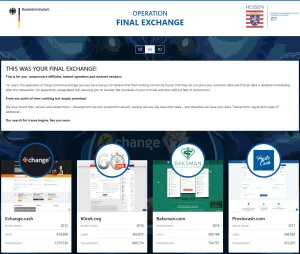Websites for these exchanges now show notices announcing a law enforcement operation called "Operation Final Exchange". The page announces to visitors "This was your final exchange!", and in a letter addressed to "ransomware affiliates, botnet operators and darknet vendors", warns that authorities are now working to trace the illicit users of the exchange.
Germany seizes 47 cryptocurrency exchanges reportedly used by ransomware groups
- "Germany seizes 47 crypto exchanges used by ransomware gangs", BleepingComputer
Almost $2 million taken from users of Telegram "Banana Gun" crypto trading bot
Banana Gun acknowledged the attack on Twitter and shut down the bot. They posted that they did not believe their backend was compromised, and stated that they believed the attack occurred via a "front-end vulnerability" — though it was not clear what this might have referred to.
- "Telegram bot Banana Gun’s users drained of over $1.9M", CoinTelegraph [archive]
Arrests made after $243 million stolen from one individual in Gemini phishing attack
The FBI raided a luxury home in Miami in connection to the theft, and arrested two men in their early twenties. Authorities worked with crypto investigators including zachxbt to trace the stolen funds.
Rari Capital settles with the SEC
The company and co-founders will pay fines, and the individuals will agree to five-year bans from serving as officers or directors.
The regional SEC director stated, "We will not be deterred by someone labeling a product as 'decentralized' and 'autonomous'," alluding to crypto firms' tendencies to try to skirt securities regulations by claiming to be "decentralized".
Rari has featured on Web3 is Going Just Great before, when they were exploited for around $80 million in April 2022 and when they were exploited for around $15 million in May 2021. The project effectively wound down soon after the second theft.
- "SEC Charges DeFi Platform Rari Capital and its Founders With Misleading Investors and Acting as Unregistered Brokers", U.S. Securities and Exchange Commission [archive]
Ethena website compromised
They later were able to deactivate the website and regain control of the domain. "Remember scammers are always chasing you," they wrote on Twitter.
$6 million taken from Delta Prime defi protocol
DeltaPrime acknowledged the attack on Twitter, and announced that "the risk is contained". They also stated that they were "looking into other ways to reduce user losses to a minimum", including by pulling from the protocol's insurance pool.
Flappy Bird creator disavows crypto spin-off
Nguyen famously removed the game from app stores shortly after it surged to popularity, stating that he felt guilty that people were becoming addicted to the game. This makes the game's reappearance — complete with loot boxes and other addictive features — feel somewhat dark.
On September 15, Nguyen returned from a seven-year Twitter hiatus to post: "No, I have no related with their game. I did not sell anything. I also don't support crypto."
Although Nguyen held the Flappy Bird trademark, he did not sell it to this group. Instead, they registered the trademark themselves after arguing he had abandoned it.
Eve Online developer angers fans with announcement that their new game will be blockchain-based
"There is still time. You can still roll it back and pretend it never happened. Please. None of us want this crypto slop, this desperate cash grab, this attempt at 'creating something great,' this game where buzzwords seem more important than gameplay," wrote one player on the game's subreddit.
A tweet announcing the game was celebrated by some crypto advocates, but attracted some critical responses from players. One wrote, "releasing a blockchain game a year after the weird hype about that technology died so now you got a shitty concept and don't even get a pay-off for it. let's see how this is going to turn out :)"
eToro settles with SEC for $1.5 million, shuts down most crypto trading
- “eToro Reaches Settlement with SEC and Will Cease Trading Activity in Nearly All Crypto Assets”, United States Securities and Exchange Commission [archive]
Adam Neumann's Flowcarbon refunds customers after failing to launch "Goddess Nature Token"
Now, Flowcarbon has reportedly been issuing refunds after the tokens have failed to materialize more than two years later. Flowcarbon has reportedly been blaming "market conditions and resistance from carbon registries" for the failure to launch, according to a report from Forbes. Flowcarbon claimed they have been offering refunds "due to industry delays" since 2023.









